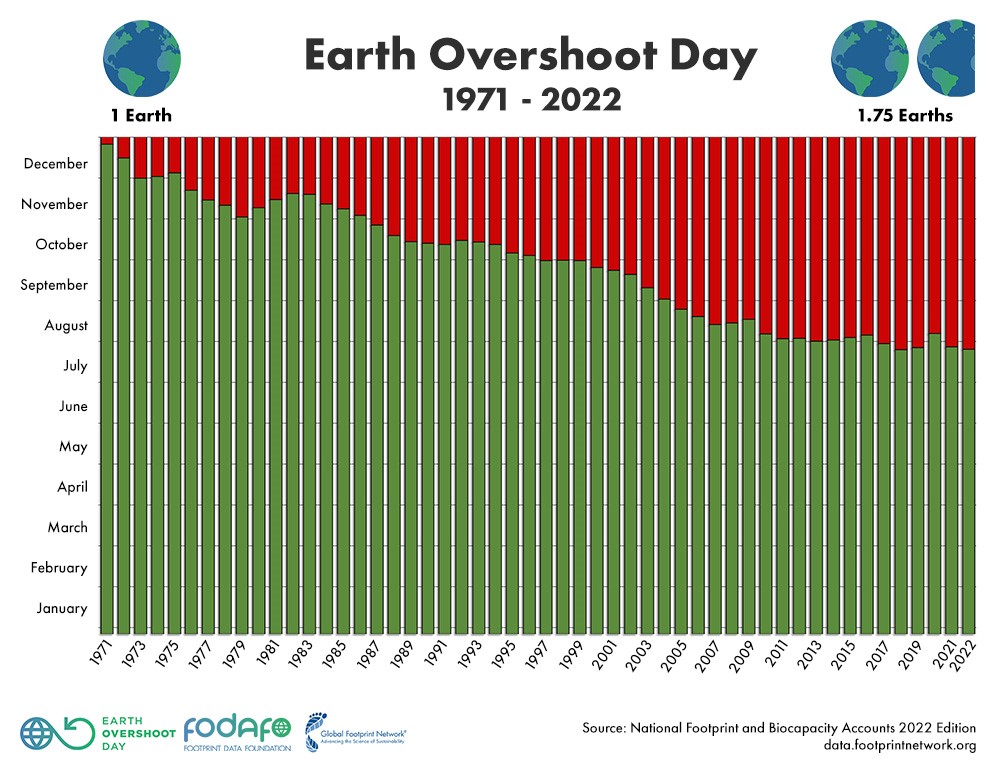
Do you know that we are indebted to our world more and more? According to the analyzes made for our planet, where we consume our resources at a rapid pace every day, 2 August has been determined as the Earth Overshoot Day. According to the Global Footprint Network (GFN) report, which measures how much people use natural resources each year and sets a "Earth Overshoot Day" for that year, the first global overshoot since 1961 was found on December 25, 1971. If we do not count the decrease in the use of natural resources due to the Covid-19 epidemic in 2020, it was stated that the global limit exceedance day receded to an earlier date almost every year than the previous one.
So what Does This Mean?
Calendars show that our resources are a little bit drier this year. Therefore, all humanity needs to act urgently against this situation. The Global Footprint Network (GFN) evaluates the data on carbon emissions and changes in forest biocapacity starting from January first with its research every year. According to this year's data, it is observed that the carbon footprint increased by 6.6 percent compared to the previous year, and the decrease in the global forest biocapacity was 0.5 percent. Due to the quarantine period due to the pandemic, although carbon emissions initially decreased (5.8% compared to 2019), there was a rapid climb in the carbon footprint with the return to normal life. The second significant change has been the negative impact of deforestation and degradation in the Amazon on global forest biocapacity.

Türkiye Exhausted Its Resources on June 22
While the Earth Overshoot Day is set to be August 2, the limit exceeding dates differ on a country basis. In this context, these dates, which are calculated one by one according to the resources consumed, also reveal who spends how much from the world's resources. Qatar became the first country to start borrowing from next year by depleting its natural resource this year on February 10. This country is followed by Luxembourg, which consumed its resources on February 14, the USA, Canada, United Arab Emirates, and Australia, which consumed its resources on March 13, respectively. Türkiye, on the other hand, consumed its natural resources as of June 22, while Jamaica, which is expected to consume its natural resources on December 20, is at the bottom of the list.
Population Growth Increases Human Demand
The world population continues to grow unpredictably. All researches in recent years show that population growth has doubled with the industrial revolution. In this context, it is predicted that the world population, which was 913 million in 1800, will exceed 9.5 billion in 2050. In other words, the world population will have increased tenfold in 250 years. As our planet is filled with more and more people every second, food and energy resources are rapidly depleted in this direction, and climate changes are felt more. Bursa Uludağ University lecturer Associate Dr. Efsun Dindar, who stated that the consumption is higher in developed countries compared to other countries, on the subject; “Across the world, we need to look at the whole picture. After all, natural resources and the world belong to us. Clean water, air and soil are a resource for all of us. There are people in Africa dying of hunger, thirst or disease every day. On the other hand, a different lifestyle continues in another continent that has the luxury of spending as if there are 5 worlds. Airplanes, which cause the most carbon footprint among transportation vehicles, are preferred more frequently in developed countries. Citizens of a more developed country in socioeconomic terms want to travel to see more of the world. Airplane is preferred to go to distant countries. In a society with luxury consumption habits, more water and energy is used and the carbon footprint increases.” she that expressed.
 Back
Back







